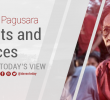All the Trapo politicians who have already started their campaign for the coming 2016 elections are adopting the “malasakit” gimmick. And it’s not even “campaign season” yet as provided by law.
From Roxas to Binay to Cayetan o to Tolentino to Villar and the rest, everyone eyeing for a national post extravagantly spends time in the squalid communities of the grassroots to woo their support wearing a garb of pretense that he has true malasakit (a sense of caring, concern, solicitude) for the masses. In the TV each of them presents a “propaganda video” showing a kind of close rapport with the poor and ministering to their needs from financial aid to water service to scholarship and or sheer platitudes.
This tactic has become so natural and commonplace among Trapo politicians. The visible difference between the politician performers is the physical appearance of the protagonists, because there are good-looking ones with built-in grins and there are those sporting doleful eyes on not so-charming faces. But the words spat out from their lips are identical expressions of disguised empathetic concern for the plight of the poor masses.
All a sham. Not one of them ever lay down an analysis or a critical study of the root causes of the longstanding problems of Philippine society. Not one has formulated a program of governance to pursue once elected to the desired post. In short, no one among these contenders has sketched a picture of the society he wants to create for the future generations. One would have asked from them their respective “vision of a future society”! But nothing. Not one has taken pains to design an architecture of a social order for the future! Such traits as malasakit (manggi-unongon, mabination, mapakabanaon) is so easy to wear as a disguise. Anybody can show, if falsely, an ostentation of caring and concern as a trait or virtue. And if that is all a presidential or senatorial bet can offer, it is bereft of substance, it is hollowness of mind. It is such an old, old gimmick and tactic from as far as the mind can remember. And it has never succeeded in effecting social transformation, much less reforms. It has not at all caused the needed uprooting of age-old societal maladies, especially under-development and poverty endured by the grassroots majority for a long, long time.
Indeed, it is very easy to feign the trait of malasakit. One just has to embrace a bedraggled slum dweller, or pose an act of extending financial aid to calamity victims, or announce the granting of scholarships to poor students, or hand a few pesos to a beggar – in front of the video camera!
And what is the bottom line of all these ? Oh, these are all meant to deceive! Hypocrisies! All of swindler’s acts! Granting that they may cause some form of benefits, will they endure through the days after the elections? Will the supposed gains be sustained? O, not even the acts of pretensions can be maintained through the elected official’s term of office, if he wins! Mind you, these Trapo politicians upon returning to their homes, would rub profuse alcohol on his parts that happened to have clasped the hands or touched the bodies of the masses during their campaign sorties in the squalid communities!
The sincerest acts and deeds of “malasakit” can only be sustainable if they are pursued as social services within or as part of a sustainable program designed to demolish the basic problems of society. And such a program can only succeed if it arises from a thorough analysis of the root causes of society’s basic ills.
For example: Has there been a critical study of the root causes of poverty? Why haven’t the Filipino people been emancipated from longstanding impoverishment since the birth of the Republic of the Philippines? Why amidst the immeasurable wealth of our country in mineral resources and the fertility of our lands the majority our people has remained sunk in dire deprivation?
Why are a handful of the country’s citizenry scandalously in extreme richness — the billionaires!—and the teeming millions have nothing? Why does it happen and how has it come about that there is no equitable distribution of the nation’s wealth or an equalitarian enjoyment of the country’s resources? Who, by the way, own and control the means of production?
Do our candidates have any idea what have been pursued by government as fundamental policies that instead of promoting development and prosperity have only deepened the economic pitfalls of our country? Have they undertaken a no- nonsense review of the historical roots of social injustice? What caused the rootedness of exploitation and oppression in our social system? What social class are exploiting bounteous resources and oppressing our people?
In answering these questions, the candidates—especially the presidential bets—can make an architectural design that shall be the basis for economic, political and cultural programs for the establishment of a just, free and progressive society.
But short of these requirements the ostentatious display of “malasakit” among the candidates will remain intimately bound up with “utang na loob” as a pernicious trait in our system of patronage politics. It will just be another round of a vicious cycle— ad infinitum and ad nauseam.






